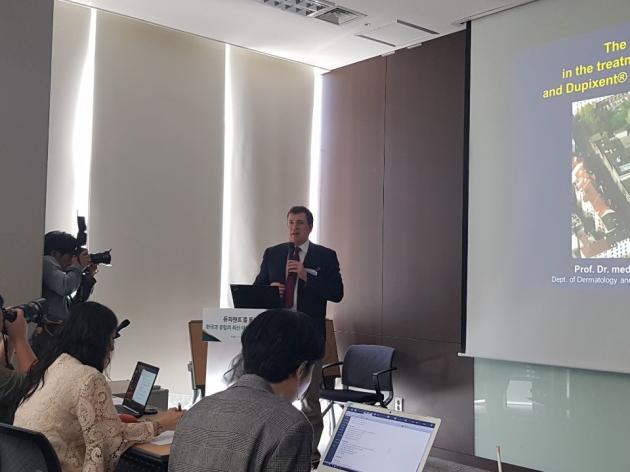Sanofi Genzyme is strengthening its position in the local atopic dermatitis market with Dupixent (ingredient: dupilumab), a treatment for moderate to severe atopic dermatitis armed with additional long-term clinical data, the company said Wednesday.

The drug may not provide an ultimate cure for patients, and the government is not granting insurance benefits, but the therapy has managed to record a high score for satisfaction among local patients, it added.
"Although the treatment items evaluated by doctors may differ from those assessed by patients, the existing treatments, in general, have not adequately met the symptoms of severe patients," Professor Kim Kyu-han from the department of dermatology at Seoul National University Hospital said in a news conference Wednesday.
Dupixent is a drug that meets such needs to some extent, he noted.
Professor Kim said conventional treatment such as topical corticosteroids, topical calcineurin inhibitors, conservative and off-label immunosuppressants still have a high rate of failure to treat severe atopic dermatitis. According to a survey conducted on doctors in Korea, more and more patients with secondary corticosteroids and immunosuppressive therapies experienced little improvement in their symptoms improve as they progressed to secondary and tertiary treatments.
"These results mean that the more severe the symptoms of atopic dermatitis get, the fewer the treatment options are," Professor Kim said.
Sanofi also claimed that Dupixent is the only treatment options available for long-term and safe use for patients with moderate-severe atopic dermatitis, who have no clear alternative to immunosuppression, such as topical steroids or cyclosporine.
Professor Andreas Wollenberg from the department of skin allergies at the University of Munich in Ludwig-Maximilians, Germany, presented an interim analysis of Dupixent open-label extension study, recently released at the Australian Academy of Dermatology Annual Meeting (ACD 2019), to support such claims.
The extension study followed up on 1,385 patients out of the 1,492 patients who were still using Dupixent after being enrolled in the treatment's previous 12 clinical studies.
As a result of comparing the measurement index of atopic dermatitis severity according to the duration of Dupixent administration, the study saw the Eczema Area and Severity Index, which is a representative measurement indicator, fall from 33.4 points to 28 points in week 52 and 28.4 points in week 72.
Also, the proportion of patients whose diseases’ extent and severity improved by more than 75 percent (EASI-75) was 86.9 percent at 52 weeks and 88.4 percent at 72 weeks.
The NRS, which scored the patient's itching score from 0 to 10, showed a 62.0 percent decrease from the baseline in week 52 and a 63.7 percent decrease in week 72.
The most common adverse events were nasopharyngitis, upper respiratory tract infections, atopic dermatitis, headache, injection site reactions, and only 1.8 percent of the participants discontinued taking the drugs due to side effects.
"In about a month after the start of treatment, Dupixent effectively treats the atopic dermatitis-related symptoms such as itching, while the effect is maintained for a long time," Professor Wollenberg said. "Currently, Dupixent is the only drug that patients can use as a systemic treatment for atopic dermatitis in the long term."
Korean and international guidelines are now adding the treatment as a medicament that can treat moderate to severe atopic dermatitis, he said. Professor Wollenberg also stressed that in countries where guidelines have not yet been revised, the drug is recommended by doctors.
Local experts, however, argued that the drug needs to receive reimbursement to benefit patients genuinely. "If cost is not a problem, local hospital will likely opt for prescribing the treatment as there are no systemic treatments for atopic dermatitis in the long term," Professor Kim said.
Sanofi Genzyme Korea said that it is discussing with the relevant authorities to get the drug reimbursed.
"We are in discussion with the Health Insurance Review and Assessment Service regarding the reimbursement of the drug," a company official said.

